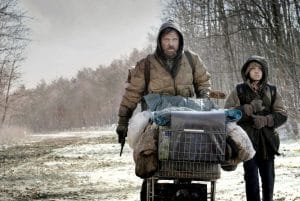The future looks bleak. Well, the future looks bleak if you are judging it by the tone of the majority of sci-fi novels, that is.
Even barring an apocalypse of some kind for the moment (we’ll return to this scenario later), the world just seems to have gone down the tube and taken humanity with it. It always seems so cutthroat and hopeless. Rare are the novels that portray a bright future, let alone a brighter one; or, in the very least, a bright future without its secret and menacing dark side.
I’m no optimist by any stretch, but the pattern has long unsettled me.
So while I was scrolling through the Dragon*Con schedule I came across an offering entitled “Rise of Dystopian Fiction & Decline of Optimism,” I couldn’t resist. I already had this post in my mind’s hopper and the panelists (all SF authors) might offer some rewarding insight. Below I share a medley of my own thoughts and those of the panelists.
Why are future worlds so bleak?
To start the panel off, author Jenna Black made the comment that there’s “not much to write about when things are going well.” I agree and disagree because I feel that the implication hidden within that statement is that entertaining/gripping/real conflict can’t take place in a future that isn’t darkened somehow.
I mean, I understand that nobody wants to read about blue skies, chirping birds, and unmolested peace, but in an attempt to keep from plodding down that particular road authors often lead us down one that (I think) overcompensates: nuclear holocausts; seemingly untouchable, all-powerful, militaristic, and (often) dictatorial governments; hugely disparate and nigh-overcomeable class systems; child soldiers. The list could go on.
And I’ve always thought that those future settings didn’t speak well of the mankind operating within them, nor of modern mankind. Do we make it too easy for authors to extrapolate from our current state to these darker times? Do we, as readers, register a significant enough disparity between the bleak futures we read of and the one which we occupy so as to require a certain suspension of disbelief, or do we accept it as plausible or even inevitable?

Circling back to apocalyptic settings: The heroes, the good guys, the compassionate, and the selfless are few in comparison to the villainous, the animalistic, the base, and the selfish. Again I wonder if that disparity is a byproduct of the circumstances portrayed in the novel or something much more sinister and damning: how humanity is perceived today projected onto tomorrow.
The scariest part of reading novels such as these is the thought that it is not pessimism that has replaced optimism…but realism that has done so. Who knows? Perhaps the rarity of heroes in the futures of these novels can be taken as a call for more heroism today.
Author Kal Spriggs offered up some interesting insight as well. He said, “Things [today] are dark and people have a tendency to turn inward…They like to think that someone has it worse than they do.” So maybe it is about perspective. We read of these dystopias and feel slightly better about our own circumstances thinking, “Well, it could be worse.” We read of characters surviving and even overcoming circumstances much more challenging than our own and we feel more hopeful about our own circumstances.
Within these novels, we’re rarely told how the world ended up in its fallen state. We tend to pick up the narrative at a point well beyond the bomb drop on the timeline; sometimes so far beyond that the characters have no knowledge of a past that does not closely resemble their present. We’re left alone with our imaginations to fill in the blanks – should we even care to.
I’m always curious as to how humanity got to this place – “this place” defined by the dystopia and how humanity operates within it. And again I find myself wrestling with the chicken-or-the-egg scenario listed above: Do we become this, or are we already this? How grand does the inciting incident have to be for us to get to this place? Watch the news…You’ll see pockets of it even today.
Spriggs closed with this simple statement: “This is a great place to start a novel.” Why? Because there’s no where to go but up. I don’t disagree. All of what I’ve listed here are not reasons why I dislike the genre or its current trends, but why I love them. They command thought and criticism from me in a way that fantasy does not. Fantasy often makes no claim on the world as we know it. Science fiction, on the other hand, boldly implies a future borne on the shoulders of our present. At times that is frightening. At other times: exciting. Either way, I’m along for the ride.
What are your thoughts on the dystopias we often encounter in science fiction? Do you agree or disagree with my observations and conjectures?

